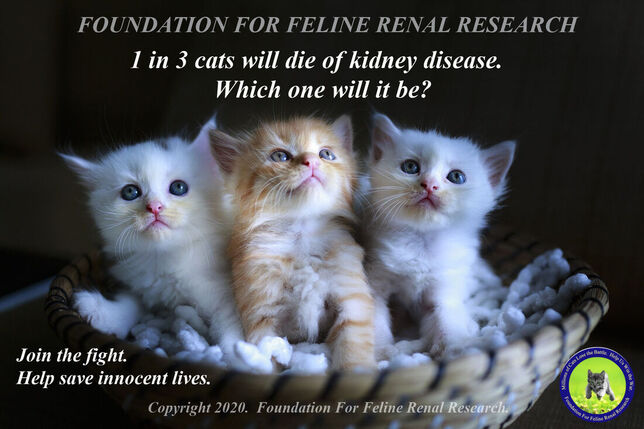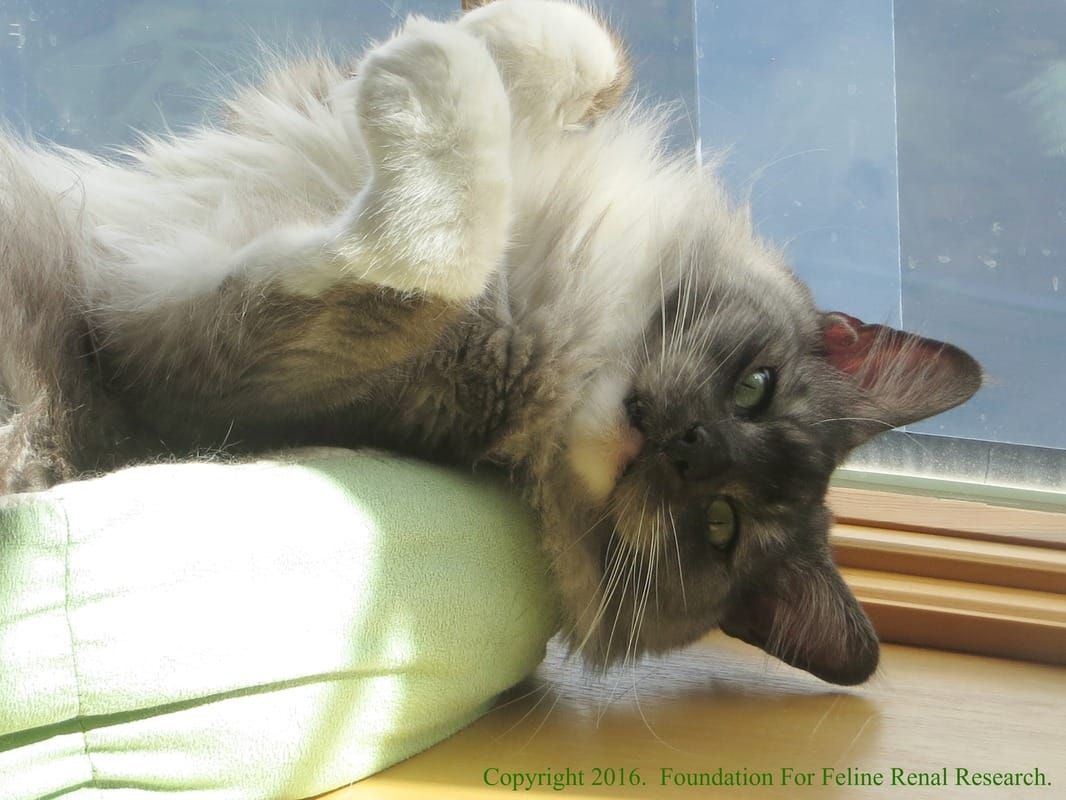Updated March 21, 2023.
Do you know that hyperthyroidism can mask Feline Chronic Kidney Disease in cats? Hyperthyroidism is a condition in which the thyroid glands produce an excess of thyroid hormone. Signs of thyroid disease can vary, but among the most common are weight loss coupled with increased appetite.
So how does hyperthyroidism mask Feline Chronic Kidney Disease? An excess of thyroid hormone causes an unhealthy and unsustainable increase in metabolic activity, which can increases the rate at which the kidneys filter toxins, thereby making them appear to be functioning better than their true condition would allow.
Additionally, weight loss associated with hyperthyroidism can cause a decrease in blood creatinine level. Creatinine is a normal byproduct of muscle activity, and is normally removed from the body by the kidneys. If the kidneys are not functioning properly, they will have a reduced ability to remove creatinine from the body via urine, and it will build up in the blood; that's why blood creatinine level is used as indicator of kidney disease. If muscle is lost due a disease such as hyperthyroidism then, because there is less muscle mass, less creatinine is produced. Therefore, blood creatinine levels could be falsely low (i.e.: closer to normal) than they would be if muscle mass were normal, thereby giving the impression that the kidneys are functioning better than they really are.
Managing Feline CKD and hyperthyroidism together can be challenging--work closely with your vet, and learn more about co-management of Feline Chronic Kidney Disease and hyperthyroidism:
Hyperthyroidism in Cats -- by Washington State University;
AAFP Guidelines for Management of Feline Hyperthyroidism --Journal of Feline Medicine and Surgery;
Chronic Kidney Disease in Cats With Hyperthyroidism --Clinician's Brief (subscription required).
Copyright 2023. Foundation For Feline Renal Research.
So how does hyperthyroidism mask Feline Chronic Kidney Disease? An excess of thyroid hormone causes an unhealthy and unsustainable increase in metabolic activity, which can increases the rate at which the kidneys filter toxins, thereby making them appear to be functioning better than their true condition would allow.
Additionally, weight loss associated with hyperthyroidism can cause a decrease in blood creatinine level. Creatinine is a normal byproduct of muscle activity, and is normally removed from the body by the kidneys. If the kidneys are not functioning properly, they will have a reduced ability to remove creatinine from the body via urine, and it will build up in the blood; that's why blood creatinine level is used as indicator of kidney disease. If muscle is lost due a disease such as hyperthyroidism then, because there is less muscle mass, less creatinine is produced. Therefore, blood creatinine levels could be falsely low (i.e.: closer to normal) than they would be if muscle mass were normal, thereby giving the impression that the kidneys are functioning better than they really are.
Managing Feline CKD and hyperthyroidism together can be challenging--work closely with your vet, and learn more about co-management of Feline Chronic Kidney Disease and hyperthyroidism:
Hyperthyroidism in Cats -- by Washington State University;
AAFP Guidelines for Management of Feline Hyperthyroidism --Journal of Feline Medicine and Surgery;
Chronic Kidney Disease in Cats With Hyperthyroidism --Clinician's Brief (subscription required).
Copyright 2023. Foundation For Feline Renal Research.
Feline Chronic Kidney Disease is a huge problem that we're working hard to solve.
Our current research study is a three year long project that costs $61/day! Please donate to help us give cats a healthier future. We're an all volunteer organization; every cent will be used to fund research. Thank you.
Our current research study is a three year long project that costs $61/day! Please donate to help us give cats a healthier future. We're an all volunteer organization; every cent will be used to fund research. Thank you.



 RSS Feed
RSS Feed


